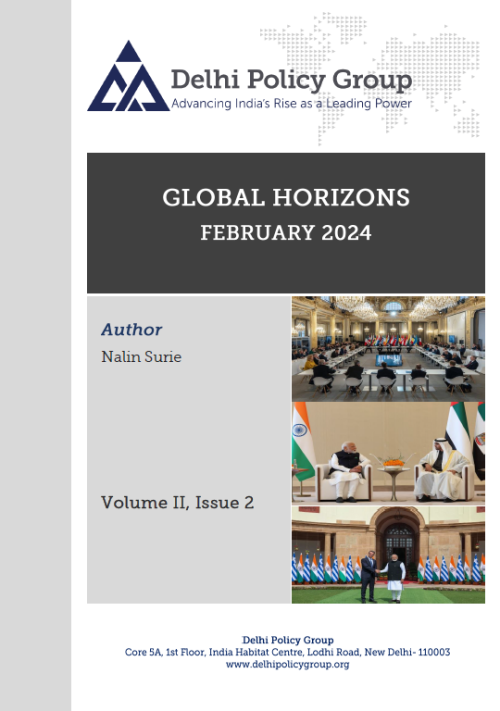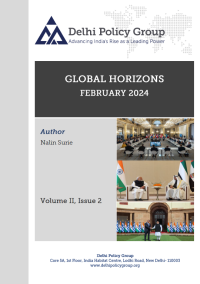Global Horizons
Date: March 07, 2024
This issue begins with the spotlight on the sombre mood across the world as wars continue in Ukraine and Gaza, and the protagonists remain intent on pursuing their interests in utter disregard of the loss of innocent lives and growing humanitarian crises.
Meanwhile, domestic political divisions in the US have begun to seriously impact US credibility as a guarantor of European security, or that of Ukraine. US inability to persuade Israel to accept a humanitarian ceasefire in Gaza has added to the Biden administration’s woes.
In this scenario, the Munich Security Conference held during the month saw growing preoccupation with the need to defend Europe, and to insulate trans-Atlantic unity from isolationist trends in the US.
US Secretary of State Blinken and Chinese Foreign Minister Wang Yi met in Munich on February 16 to continue the high-level US-China dialogue, with Blinken emphasising peace and stability in East Asia, while Wang Yi stressed that Taiwan is a part of China, and economic decoupling would backfire on the US.
Brazil as Chair of the G20 hosted its first meeting of G20 Foreign Ministers on February 21-23, indicating that it will pursue approaches already followed by Indonesia and India and lay emphasis on the needs of the Global South, global governance reform, restoring trust in multilateralism, and ensuring a fair international order.
PM Modi visited the UAE and Qatar from February 13-15. India and the UAE made further advances in their growing economic engagement, and supported the early operationalisation of the India-Middle East-Europe Economic Corridor (IMEC). PM Modi delivered the special keynote address at the World Governments Summit in Dubai on February 14. His visit to Qatar on February 15 saw agreement on the need for strategic partnership and investments in key sectors of energy and technology.
India hosted a state visit by PM Kyriakos Mitsotakis of Greece on February 21-22, where again the importance of IMEC was emphasised by both sides.
The author concludes that in the prevailing scenario of conflict and growing disarray in international institutions, there is dire need to resurrect the original compact of the United Nations: ending the scourge of war, and promoting social progress in larger freedom.
To read this Global Horizons, Vol. II, Issue 2, please see the PDF attached.
Meanwhile, domestic political divisions in the US have begun to seriously impact US credibility as a guarantor of European security, or that of Ukraine. US inability to persuade Israel to accept a humanitarian ceasefire in Gaza has added to the Biden administration’s woes.
In this scenario, the Munich Security Conference held during the month saw growing preoccupation with the need to defend Europe, and to insulate trans-Atlantic unity from isolationist trends in the US.
US Secretary of State Blinken and Chinese Foreign Minister Wang Yi met in Munich on February 16 to continue the high-level US-China dialogue, with Blinken emphasising peace and stability in East Asia, while Wang Yi stressed that Taiwan is a part of China, and economic decoupling would backfire on the US.
Brazil as Chair of the G20 hosted its first meeting of G20 Foreign Ministers on February 21-23, indicating that it will pursue approaches already followed by Indonesia and India and lay emphasis on the needs of the Global South, global governance reform, restoring trust in multilateralism, and ensuring a fair international order.
PM Modi visited the UAE and Qatar from February 13-15. India and the UAE made further advances in their growing economic engagement, and supported the early operationalisation of the India-Middle East-Europe Economic Corridor (IMEC). PM Modi delivered the special keynote address at the World Governments Summit in Dubai on February 14. His visit to Qatar on February 15 saw agreement on the need for strategic partnership and investments in key sectors of energy and technology.
India hosted a state visit by PM Kyriakos Mitsotakis of Greece on February 21-22, where again the importance of IMEC was emphasised by both sides.
The author concludes that in the prevailing scenario of conflict and growing disarray in international institutions, there is dire need to resurrect the original compact of the United Nations: ending the scourge of war, and promoting social progress in larger freedom.
To read this Global Horizons, Vol. II, Issue 2, please see the PDF attached.



